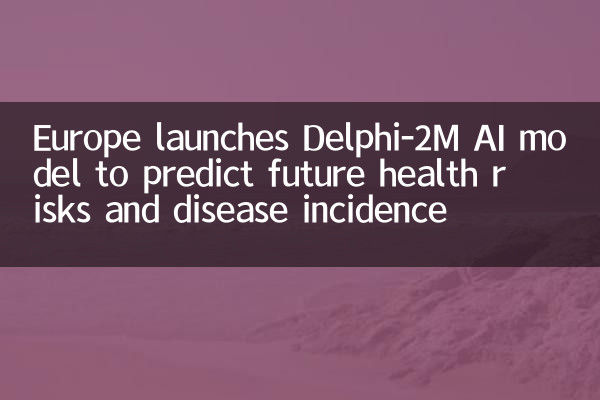Europe launches Delphi-2M AI model to predict future health risks and disease incidence
Recently, the European scientific research team announced the launch of aDelphi-2MThe AI model, which can predict future health risks and the probability of disease occurrence by analyzing patients' medical data. This breakthrough technology is believed to significantly improve the accuracy of personalized medical care and provide new tools for public health management.
The core functions and technical principles of Delphi-2M

Delphi-2M is based on deep learning and large-scale medical data set training. It can integrate multi-dimensional data such as patients' electronic health records, genomic data, lifestyle information, etc. to generate personalized health risk assessment reports. The following are its core functions and technical features:
| Function | describe |
|---|---|
| Disease risk forecast | It can predict the probability of chronic diseases such as diabetes, cardiovascular disease, cancer and other diseases in the next 5-10 years |
| Health intervention advice | Provide personalized diet, exercise and medical intervention programs based on risk assessment results |
| Real-time data update | Support dynamic updates of patient data, reassess risks and adjusts predicted results |
| Multilingual support | Supports major European languages such as English, French, and German, and is convenient for cross-regional application |
Application scenarios and potential impacts of Delphi-2M
The model has been piloted in several European medical institutions, and preliminary results show that its identification accuracy of high-risk patients is more than 90%. The following are its main application scenarios:
| Application areas | Specific use |
|---|---|
| Clinical medical | Assist doctors to formulate personalized treatment plans to intervene in high-risk patients in advance |
| Public Health | Help governments identify regional disease trends and optimize resource allocation |
| Health Management | Provide long-term health monitoring and prevention advice for individuals |
| Insurance industry | Optimize insurance pricing model to reduce compensation risks |
Comparison with other AI health models
Delphi-2M is not the first AI model for health prediction, but it has significant advantages in data size and prediction range. Here is a comparison with other mainstream models:
| Model name | Development Organization | Main functions | Data Scale |
|---|---|---|---|
| Delphi-2M | European Health AI Alliance | Long-term prediction of multiple diseases | 2 million+ patient data |
| DeepHeart | Google Health | Cardiovascular disease prediction | 500,000+ patient data |
| MedPredict | MIT | Cancer risk analysis | 300,000+ patient data |
Controversy and Challenge
Although Delphi-2M shows strong potential, its application also faces some controversy and challenges:
1.Data privacy issues: The collection and use of patient medical data must comply with strict privacy regulations, such as the EU's General Data Protection Regulation (GDPR).
2.Model bias: If the training data lacks diversity, it may lead to inaccurate prediction results for some populations.
3.Ethical issues: Insurers or employers may abuse the predicted results and discriminate against high-risk patients.
Future Outlook
The R&D team said that in the future, it will further expand the data coverage of Delphi-2M and explore linkage with wearable devices to achieve more real-time health monitoring. At the same time, they called for the establishment of industry norms to ensure the fair and transparent use of AI in the medical field.
The launch of Delphi-2M marks another leap in the field of medical and health care, and its long-term impact deserves continued attention.

check the details

check the details